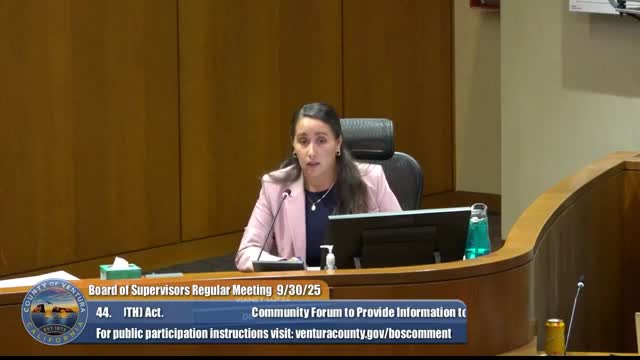Community coalition and dozens of residents urge Ventura County to end voluntary ICE cooperation, call for oversight and legal aid
October 03, 2025 | Ventura County, California
This article was created by AI summarizing key points discussed. AI makes mistakes, so for full details and context, please refer to the video of the full meeting. Please report any errors so we can fix them. Report an error »

Dozens of residents and advocates told the Ventura County Board of Supervisors during the Truth Act forum that voluntary cooperation between local law enforcement and U.S. Immigration and Customs Enforcement harms community trust and public safety and must end.
Willie Luke, a Thousand Oaks resident who identified himself with Buen Vecino and the ICE Out of Ventura County Coalition, said the forum’s statutory purpose includes both transparency and accountability. “County officials are required to receive and consider public comments,” he told the board, and urged the sheriff to “reconsider the policy of voluntary ICE cooperation.”
Speakers representing immigrant-rights organizations, farmworker advocates, clergy, legal-aid providers and residents described repeated examples of raids and arrests — including the July 10 Glass House operation repeatedly referenced during the forum — and said masked federal agents, tear gas and community disturbances have driven fear across neighborhoods. Several speakers said the presence of local law enforcement at or near federal operations had appeared to facilitate removals and increased community fear.
Public presenters made three persistent requests: (1) end voluntary transfers and stop responding to ICE release notifications, (2) create or strengthen county oversight of sheriff operations, and (3) fund or facilitate legal defense for residents at risk of removal. Multiple speakers argued that voluntary cooperation reduces crime reporting and undermines victim safety; one noted studies showing non-cooperation policies in other counties were associated with increased reporting and community trust.
Community groups and speakers also raised fiscal concerns. One local organizer cited two Los Angeles–area studies that estimated multimillion-dollar local costs for ICE transfers in larger counties and offered a back-of-the-envelope range of $100,000–$300,000 annually as a possible Ventura estimate. Several speakers asked supervisors to scrutinize VCSO overtime and other ICE-related expenses and to direct the sheriff to provide a detailed accounting.
Speakers who described personal or familial impacts included farmworkers, youth organizers, clergy, professionals who work with survivors of domestic violence, and attorneys who represent immigrants. Attorney Jahan Lanner of the Immigrant Legal Resource Center said many people transferred to ICE remain eligible for relief in immigration court and that transfers can amount to “double punishment” when people serve a criminal sentence and are then placed into civil immigration detention without counsel.
The forum drew large turnout: staff announced an initial 52 public commenters; later the clerk said roughly 60–69 people were in the queue. The meeting was a required public forum and concluded after public comment; supervisors did not vote on any policy change during the session.
Willie Luke, a Thousand Oaks resident who identified himself with Buen Vecino and the ICE Out of Ventura County Coalition, said the forum’s statutory purpose includes both transparency and accountability. “County officials are required to receive and consider public comments,” he told the board, and urged the sheriff to “reconsider the policy of voluntary ICE cooperation.”
Speakers representing immigrant-rights organizations, farmworker advocates, clergy, legal-aid providers and residents described repeated examples of raids and arrests — including the July 10 Glass House operation repeatedly referenced during the forum — and said masked federal agents, tear gas and community disturbances have driven fear across neighborhoods. Several speakers said the presence of local law enforcement at or near federal operations had appeared to facilitate removals and increased community fear.
Public presenters made three persistent requests: (1) end voluntary transfers and stop responding to ICE release notifications, (2) create or strengthen county oversight of sheriff operations, and (3) fund or facilitate legal defense for residents at risk of removal. Multiple speakers argued that voluntary cooperation reduces crime reporting and undermines victim safety; one noted studies showing non-cooperation policies in other counties were associated with increased reporting and community trust.
Community groups and speakers also raised fiscal concerns. One local organizer cited two Los Angeles–area studies that estimated multimillion-dollar local costs for ICE transfers in larger counties and offered a back-of-the-envelope range of $100,000–$300,000 annually as a possible Ventura estimate. Several speakers asked supervisors to scrutinize VCSO overtime and other ICE-related expenses and to direct the sheriff to provide a detailed accounting.
Speakers who described personal or familial impacts included farmworkers, youth organizers, clergy, professionals who work with survivors of domestic violence, and attorneys who represent immigrants. Attorney Jahan Lanner of the Immigrant Legal Resource Center said many people transferred to ICE remain eligible for relief in immigration court and that transfers can amount to “double punishment” when people serve a criminal sentence and are then placed into civil immigration detention without counsel.
The forum drew large turnout: staff announced an initial 52 public commenters; later the clerk said roughly 60–69 people were in the queue. The meeting was a required public forum and concluded after public comment; supervisors did not vote on any policy change during the session.
View full meeting
This article is based on a recent meeting—watch the full video and explore the complete transcript for deeper insights into the discussion.
View full meeting
